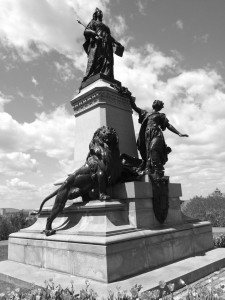It is now day one-hundred-and-four of Russia’s invasion of Ukraine, and Russia has turned over several of the bodies of Russian fighters from that steel mill in Mariupol where they were holed up for weeks. Missiles continue to fall over other parts of the country, and president Volodymyr Zelensky warns that Russians are targeting the city of Zaporizhzhia in the south, as a means of advancing further into the centre of the country. As well, here is a thread about Russia’s cyberwar in Ukraine, and how they route Ukrainian internet through Russian servers when they take over territory as a means of controlling information.
#Ukraine's President Zelensky meets with Ukrainians displaced by #Russia's invasion to reassure them they will return home, that his aims are to liberate all the areas "temporarily occupied" by the Russians. pic.twitter.com/MxogrodeGK
— Kyle Orton (@KyleWOrton) June 6, 2022
Zelensky actually went right into the Severodonetsk salient. Remarkable pic.twitter.com/6tc0EKoeen
— Oliver Carroll (@olliecarroll) June 6, 2022
Meanwhile, a lot of attention has been paid to the confidence vote that UK prime minister Boris Johnson was subjected to within his own party, which he barely survived, and at a much lower margin than other UK prime ministers survived theirs before they made their political exits. With 42 percent of your caucus against you, you cannot survive more than a few more months. It’s simply untenable. Of course, Michael Chong had to pipe up to make yet another pitch for his (garbage) Reform Act and trying to goad the Liberals into signing onto it, which is wrong, and tiresome. Like the Liberals did when Chong first proposed the bill, there was this assertion that this would be what would do in Stephen Harper because his caucus must hate him, erm, except they didn’t. And Chong is making the very same assertion here, which seems to be yet one more Conservative falling into the trap of believing that people hate Trudeau as much as they do. Additionally, as I have stated time and time again, MPs did not need Chong’s garbage legislation to be able to oust leaders—they already had that power if they chose to use it. Putting a legislative framework around those powers only curtails them by stealth, while pretending to “give” MPs powers they already have, it absolutely limited senators’ powers within their caucuses, and it gave leaders even more insulation by putting up thresholds to levels beyond what would ordinarily have been considered fatal to a leader. It doesn’t need to spread further.
https://twitter.com/PickardJE/status/1533902493322776576
Parties do not need to sign onto the (garbage) Reform Act in order to push a leader out. Thinking that they need legislation in order to exercise powers they already have is a way of limiting their powers by stealth. https://t.co/DzlUt8uaZG
— Dale Smith (@journo_dale) June 6, 2022

